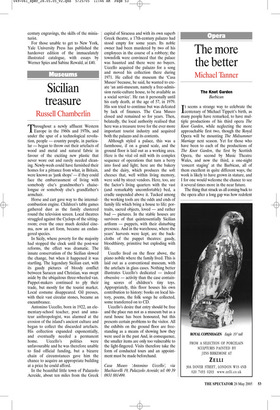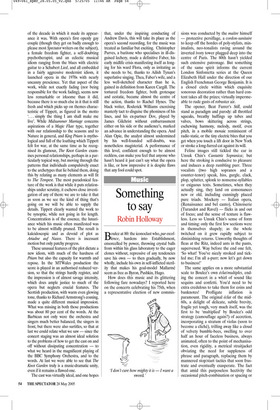The more the better
Michael Tanner
The Knot Garden Barbican
It seems a strange way to celebrate the centenary of Michael Tippett’s birth, as many people have remarked, to have multiple productions of his third opera The Knot Garden, while neglecting the more approachable first two, though the Royal Opera will be mounting The Midsummer Marriage next season. Yet for those who have been to each of the productions of The Knot Garden, the first by Scottish Opera, the second by Music Theatre Wales, and now the third, a one-night ‘concert staging’ at the Barbican, all of them excellent in quite different ways, the work is likely to have grown in stature, and I for one would welcome the chance to see it several times more in the near future.
The thing that struck us all coming back to the opera after a long gap was how redolent of the decade in which it made its appearance it was. With opera’s first openly gay couple (though they get on badly enough to please most Spectator writers on the subject), a female freedom fighter, a self-doubting psychotherapist, and an eclectic musical idiom ranging from the blues with electric guitar to a Schubert Lied, and all embedded in a fairly aggressive modernist idiom, it launched opera in the 1970s with nearly uncanny prescience. Yet that aspect of the work, while not exactly fading (nor being responsible for the work fading), seems now less remarkable or irksome than it did, because there is so much else in it that is still fresh and which picks up on themes characteristic of Tippett, as figured in the motto ‘... simply the thing I am shall make me live’. While Midsummer Marriage concerns aspirations of a Magic Flute type, together with our relationship to the seasons and to Nature in general, and King Priam is mythological and full of the loathing which Tippett felt for war, at the same time as he recognised its glamour, The Knot Garden examines personal relationships, perhaps in a particularly topical way, but moving through the patterns that individuals compulsively enact to the archetypes that lie behind them, doing this by relating as many elements as will fit to The Tempest. The most paradoxical feature of the work is that while it puts relationships under scrutiny, it eschews close investigation of any of them: we are to take it that as soon as we see the kind of thing that’s going on we will be able to supply the details. Tippett clearly wanted the work to be synoptic, while not going in for length. Concentration is of the essence, the luxuriance which his music often manifested was to be almost wilfully pruned. The result is kaleidoscopic and as devoid of plot as Ariadne auf Naxos. There is incessant motion but only patchy progress.
These unusual features of the plot dictate a new idiom, with much of the hardness of Priam but also the capacity for warmth and repose. In the MTWales production the score is played in an authorised reduced version, so that the strings hardly register, and the impression is of almost savage intensity, which does ample justice to much of the opera but neglects crucial features. The Scottish production, with warm even glowing tone, thanks to Richard Armstrong’s coaxing, made a quite different musical impression. What was missing in both those productions was about 80 per cent of the words. At the Barbican not only were the orchestra and singers much better balanced, the singers in front, but there were also surtitles, so that at last we could relate what we saw — since the concert staging was an almost ideal solution to the problems of how to get the cast on and off without dissipating concentration — to what we heard in the magnificent playing of the BBC Symphony Orchestra, and to the words. At last we were able to see that The Knot Garden truly is a music-dramatic unity, even if it remains a flawed one.
The cast was virtually ideal, and one hopes that, under the inspiring conducting of Andrew Davis, this will take its place as the opera’s second recording, for the music was treated as familiar but exciting. Christopher Purves, a baritone who specialises in ill-disguised lechery, made a definitive Faber, his early midlife crisis manifesting itself as longing for his ward Flora, only as irritating as she needs to be, thanks to Ailish Tynan’s superlative singing. Thea, Faber’s wife, and a less well-sketched character than he is, gained in definition from Karen Cargill. The tortured freedom fighter, both grotesque and ecstatic, became almost the centre of the action, thanks to Rachel Hynes. The black writer, Roderick Williams exercising masterly tact to disguise the phoniness of his lines, and his ex-partner Dov, played by James Gilchrist without embarrassment either on his side or the audience’s, marked an advance in understanding the opera. And Alan Opie, the analyst almost undermined by his well-founded self-doubts, was nonetheless magisterial. A performance of this level, confident enough to be almost reckless, can make you feel that anyone who hasn’t heard it just can’t say what the opera is like, or how impressive it is despite flaws that any fool could spot.























































 Previous page
Previous page